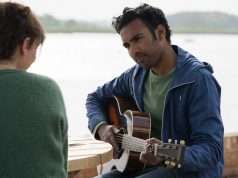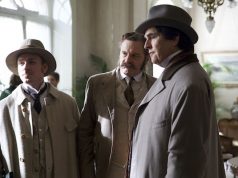If “The Next Best Thing” doesn’t turn out to be among the five worst movies of the year, it won’t be for lack of trying.
It has all the makings of a terrible movie. It casts Madonna, who has never been capable of acting, as its lead, and she even uses some weird, unidentifiable accent. Then it makes her act opposite Rupert Everett, who is normally very good but who is here saddled (as is everyone) with atrociously ridiculous dialogue and no characterization. Then it lets everyone act in the most wooden, stilted fashion possible, making the already-absurd storyline seem even more implausible because we never actually believe a single word anyone says.
It preaches, too, about same-sex marriages and other gay issues, so much that it could probably make someone who is inclined to be sympathetic toward gay rights start changing their mind (you know, like missionaries who are so bad they actually make people NOT interested in their religion).
It also, it goes without saying, provides no direction for anyone, resulting in zero chemistry, zero tension, zero laughs, zero everything.
And don’t let me forget the cliches. Oh, my, the cliches. Abbie (Madonna) and Robert (Everett) are best friends in L.A. They have generic L.A. jobs (yoga instructor and gardener-for-rich-people, respectively). They are both generically unlucky with men. Robert’s gay friends are gay because they talk about Ethel Merman and because one of them dies of AIDS (which, if movies have taught us anything, is the only thing that gay people ever die of). Abbie goes into labor precisely at the most comical moment imaginable, and then yells, on the delivery table, “Give me every drug you’ve got!” (Who WRITES this stuff?!)
After a night of accidentally having sex with each other (liquor is involved), Abbie gets pregnant with Robert’s child. They decide, in a matter of seconds, that they should live together and raise the child, while still living their separate hetero- and homosexual lives. Naturally, they can’t imagine this leading to any problems whatsoever, and if it does, it will be because of the Narrow-Mindedness of the world, and not because their child will wonder why Mommy and Daddy sleep in separate bedrooms and date other people.
Approximately five movie-minutes after Abbie gets pregnant, their son, Sam, is 6 years old. Then Abbie meets and falls in love with Ben (Benjamin Bratt), and wants to marry him, which would involve moving to New York (the generic opposite of L.A., of course), but Robert can’t leave L.A., but he doesn’t want to give up his son, either, and there’s a generic courtroom battle, and the movie ends generically and sadly. Then, over the closing credits, we’re told by words on the screen that things actually turned out OK after all — as if to say, “Oh, that sad ending — you know, the one part of the movie that actually seemed based in reality? — we were kidding about that. Everything’s fine.”
Even the actors don’t seem to be having a good time in this joyless, hollow train wreck. And it’s no wonder: Director John Schlesinger has left them directionless, allowing them to wander aimlessly in a sea of cliches and bad dialogue (I swear, the “morning after” scene looks like a bad improvisation), giving them no motivation or character arcs.
This movie isn’t hell itself, but it is the next best thing.
F (1 hr., 50 min.; )
In 2012, I reconsidered this movie for my Re-Views column at Film.com.





